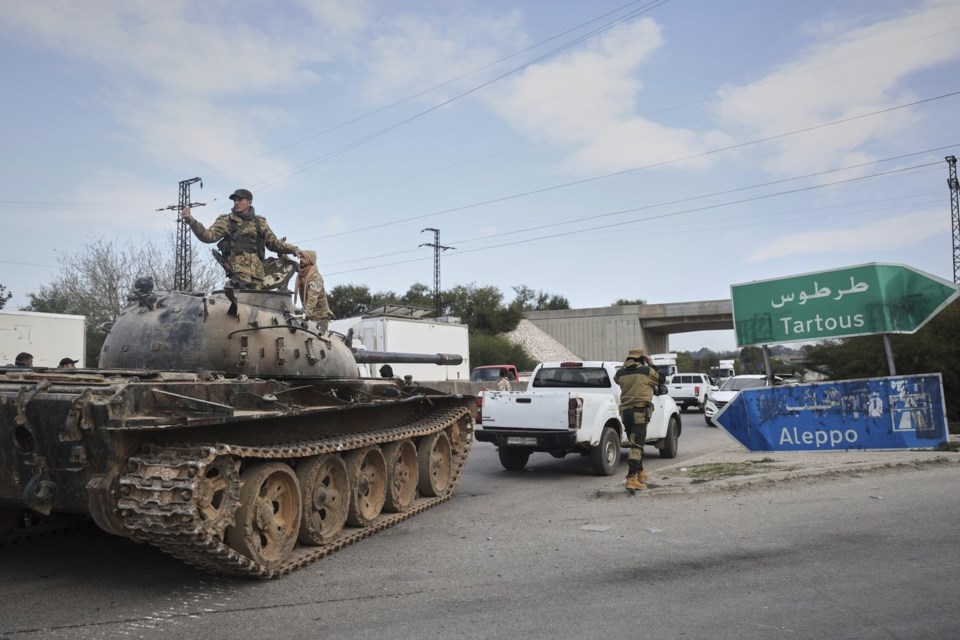BEIRUT (AP) — A month after a wave of revenge attacks left hundreds of Alawite civilians dead, members of the Syrian religious minority are still living in fear, with dozens killed in smaller attacks since the start of April.
The Muslim minority group was seen as a privileged minority under the rule of the Alawite Assad family, but since Bashar Assad ’s government fell late last year members have feared revenge from the country’s Sunni majority.
The new government promised to protect minority groups, but when a group of Assad loyalists attacked security forces near the coastal city of Latakia last month, it sparked a counteroffensive that took a brutal toll on the coastal region’s largely Alawite population.
Britain-based war monitor the Syrian Observatory for Human Rights estimates that more than 1,700 people, most of them civilians, were killed in March. While no official figures have been released by the government, other human rights groups have given similar estimates. It was the worst violence since an insurgency led by Islamist group Hayat Tahrir al-Sham overthrew Assad last December.
Militias target Alawites
Rights groups reported widespread revenge killings as militants from Syria's Sunni majority targeted Alawites, regardless of whether they were involved in the insurgency.
“Several people told me that when these militia members entered their home, in addition to asking if they were Alawite or Sunni, they blamed them for what happened to them under the former Assad government,” said Diana Semaan, Amnesty International’s Syria researcher who investigated dozens of killings that took place in Baniyas and spoke to eyewitnesses and survivors.
While there has not been another outbreak of violence on the same scale, Alawites continue to report incidents of harassment, shakedowns and sometimes worse.
An Alawite who lives in the Latakia area said there are still regular attacks targeting Alawites, most of whom had nothing to do with the Assad government or security forces.
“Everyone from the regime or close to it fled a long time ago,” he told The Associated Press, speaking on condition of anonymity out of fear for his life.
He said a 20-year-old factory worker who was the breadwinner of his family was shot by guards at a local checkpoint, even though he had not served in the army under Assad.
“He would pass the checkpoints on his motorcycle every day. He and the guards would even greet each other," he said.
Attacks spread along the coast
Attacks on Alawites spread from Latakia into the nearby province of Tartus, with some later hitting the major city of Homs inland.
Rami Abdurrahman, who heads the Observatory, said 42 people have died in sectarian killings since the Muslim feast of Eid el-Fitr that marks the end of Ramadan on March 30.
“The killings, did not stop but now they are individual acts,” Abdurrahman said.
Mohammed Saleh, an activist from the central city of Homs who spent 17 years imprisoned during the rule of Bashar Assad and his father because of his opposition to the government, said victims of the attacks included Alawites who opposed Assad’s rule. Saleh said 18 people he knew personally who had previously been detained by Assad’s forces were killed in last month’s attacks.
Saleh said he is worried that Syria is turning from one dictatorship to another.
“What we want is to have serious national army and security agencies whose job is to protect everyone and that they include everyone and not be made up of one sect or one religion,” Saleh said. “There cannot be a state for everyone when security agencies belong to one sect.”
One high school in the city of Baniyas in Tartus province, posted a list on Facebook of almost 80 teachers, students and relatives and alumni who were killed in attacks over the past month.
A video widely shared on social media showed the bodies of two young men with their mother standing by them, as the person filming scolded her and said her sons deserved to die because they were Alawite.
Tens of thousands of Alawites flee to Lebanon
Alawites and other Syrians from coastal areas are fleeing into Lebanon through unofficial border crossings, some carrying babies and helping tired elderly people and pregnant women as they cross over a river dividing the two countries.
Some 30,000 Alawite Syrians have fled to Lebanon over the past month, the United Nation’s refugee agency says, scattered in some 30 towns and villages in northern Lebanon. While there is little assistance for them in Lebanon, many don’t feel safe enough to go back.
Attacks test the interim government's promises
Ongoing attacks have been a major letdown for Syrians who hoped that Assad's sudden fall would spell an end to violence against the country's many religious and ethnic groups after over a decade a war that killed hundreds of thousands of people.
The new government has promised to create an inclusive state that holds perpetrators of crimes to account, and interim President Ahmad al-Sharaa has vowed to hold the perpetrators of recent attacks to justice and set up a committee to investigate the attacks.
A few arrests have been reported, and the committee has said it is continuing its investigation in the coastal province, though they have not yet disclosed their findings.
Right groups say the interim government faces a test.
“What happens now is extremely important because it will literally set the path towards justice. We’re no longer talking about addressing past violations and holding those perpetrators accountable, which is already a huge endeavor,” said Amnesty International's Semaan. “Now we’re looking at how the government at how it will set paths towards justice for the violations that it (has) committed.“
Bassem Mroue And Kareem Chehayeb, The Associated Press



